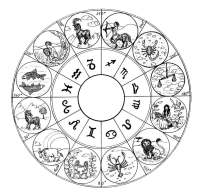Astrology: Difference between revisions
No edit summary |
No edit summary |
||
| Line 1: | Line 1: | ||
[[File:12 Zodiac Signs.png|thumb|200x200px|<center>The 12 zodiac signs on a wheel</center>]]Astrology is a complex system of divinatory tools that has been in existence since the 3rd millennium BC and has sought to understand and interpret the movements and positions of celestial bodies, such as planets and stars, in relation to human experience and the natural world. | [[File:12 Zodiac Signs.png|thumb|200x200px|<center>The 12 zodiac signs on a wheel</center>]]Astrology is a complex system of divinatory tools that has been in existence since the 3rd millennium BC and has sought to understand and interpret the movements and positions of celestial bodies, such as planets and stars, in relation to human experience and the natural world.<ref>Koch-Westenholz, Ulla (1995). Mesopotamian astrology: an introduction to Babylonian and Assyrian celestial divination. Copenhagen: Museum Tusculanum Press. ISBN <bdi>978-87-7289-287-0</bdi>.</ref> Although critics of astrology argue that there is no scientific evidence to support its claims and that astrology relies on generalizations and subjective interpretations, many people continue to use astrology for self-awareness, personal growth and understanding the patterns and cycles of their lives. | ||
Until the 17th century, astrology helped drive the development of astronomy and was considered a scholarly tradition. It was commonly accepted in political and cultural circles with some of its concepts finding use in meteorology and medicine. By the end of the 17th century, scientific concepts in astronomy such as heliocentrism emerged which weakened the theoretical basis of astrology. By early 18th century, astrology had lost its academic standing and was regarded as a pseudoscience. Scientific investigation that relies on empiricism has shown that astrological predictions are not accurate. | Until the 17th century, astrology helped drive the development of astronomy and was considered a scholarly tradition. It was commonly accepted in political and cultural circles with some of its concepts finding use in meteorology and medicine. By the end of the 17th century, scientific concepts in astronomy such as heliocentrism emerged which weakened the theoretical basis of astrology. By early 18th century, astrology had lost its academic standing and was regarded as a pseudoscience. Scientific investigation that relies on empiricism has shown that astrological predictions are not accurate. | ||
== References == | |||
__TOC__ | __TOC__ | ||
Revision as of 09:28, 28 March 2023
Astrology is a complex system of divinatory tools that has been in existence since the 3rd millennium BC and has sought to understand and interpret the movements and positions of celestial bodies, such as planets and stars, in relation to human experience and the natural world.[1] Although critics of astrology argue that there is no scientific evidence to support its claims and that astrology relies on generalizations and subjective interpretations, many people continue to use astrology for self-awareness, personal growth and understanding the patterns and cycles of their lives.
Until the 17th century, astrology helped drive the development of astronomy and was considered a scholarly tradition. It was commonly accepted in political and cultural circles with some of its concepts finding use in meteorology and medicine. By the end of the 17th century, scientific concepts in astronomy such as heliocentrism emerged which weakened the theoretical basis of astrology. By early 18th century, astrology had lost its academic standing and was regarded as a pseudoscience. Scientific investigation that relies on empiricism has shown that astrological predictions are not accurate.
References
- ↑ Koch-Westenholz, Ulla (1995). Mesopotamian astrology: an introduction to Babylonian and Assyrian celestial divination. Copenhagen: Museum Tusculanum Press. ISBN 978-87-7289-287-0.
